North Carolina Central University awarded bachelor’s degrees to 536 students on Saturday, May 12, in commencement ceremonies at O’Kelly–Riddick Stadium.
 But before the graduates walked across the stage to collect their diplomas, they were rousingly challenged by the Rev. William Barber II to engage in the never-ending fight for social justice. Barber, a 1985 graduate of NCCU and the president of the North Carolina State Conference of the NAACP, brought the crowd to its feet with an address that recalled the messages and the cadences of the Rev. Martin Luther King Jr.
But before the graduates walked across the stage to collect their diplomas, they were rousingly challenged by the Rev. William Barber II to engage in the never-ending fight for social justice. Barber, a 1985 graduate of NCCU and the president of the North Carolina State Conference of the NAACP, brought the crowd to its feet with an address that recalled the messages and the cadences of the Rev. Martin Luther King Jr.
“You live at a turning point in history,” Barber said. “These are tough times, troubling times. We see mean and oppressive politics taking us in the wrong direction. Why are you here? Because there’s a God who has to raise a counterforce to injustice.”
Barber noted that he had recently concluded a statewide “Putting a Face on Poverty Tour,” drawing attention to the continuing reality that 1.6 million state residents — including 600,000 children — live below the poverty line. “We found human beings living under bridges and in the woods,” he said. “We have seen poverty that makes you sick and ashamed.
“The soul of our nation is on trial,” Barber said. “If our values are right and our budgets are just, we can build a better society. We can put the poor at the center of our public policy agenda. We can reject hate and division. We can finish the job of being, in word and deed, one nation under God with liberty and justice for all.”
NCCU Chancellor Charlie Nelms presented Barber with an honorary Doctor of Humane Letters degree and citation “in recognition of his tireless service to society as a warrior for justice and social change and a speaker of truth to power.”
As has become his custom at commencement ceremonies, Nelms publicly recognized a few of the graduates for their accomplishments and their success in overcoming obstacles.
He praised LaSaundra Maynor, who graduated cum laude with a Bachelor of Science degree in Public Health Education. A mother of three, she was encouraging her eldest daughter to plan for college when her daughter urged her to do the same. So Maynor enrolled at NCCU, taking her classes and completing internships while continuing to work five 12-hour shifts a week as a nursing staff specialist at Durham Regional Hospital.
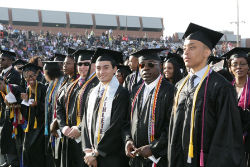 He also praised Alejandro Espitia as “an exemplar of the phrase student-athlete.” Espitia, a native of Bogota, Colombia, graduated summa cum laude with a Bachelor of Arts degree in political science. He was captain of the NCCU tennis team and also performed many hours of community service as a tennis teacher to poor children and a volunteer at many events. He will enter law school at the University of Pennsylvania in the fall.
He also praised Alejandro Espitia as “an exemplar of the phrase student-athlete.” Espitia, a native of Bogota, Colombia, graduated summa cum laude with a Bachelor of Arts degree in political science. He was captain of the NCCU tennis team and also performed many hours of community service as a tennis teacher to poor children and a volunteer at many events. He will enter law school at the University of Pennsylvania in the fall.
Four faculty members were honored during the ceremony. Dr. Ira T. Wiggins, longtime director of NCCU’s renowned Jazz Studies program, received the UNC Board of Governors Award for Excellence in Teaching. NCCU awards for teaching excellence were presented to Dr. Prince Hycy Bull, associate professor and coordinator of educational technology at the School of Education; Dr. La Verne Reid, associate dean of the College of Behavioral and Social Science and professor of Public Health Education; and Dr. James Pearce, associate professor of English and director of the English Department’s graduate program.
Two longtime members of the NCCU Board of Trustees, Kay T. Thomas and R. Edward Stewart, were awarded the titles of trustees emeriti.
This was the second year in which NCCU conducted separate commencement exercises for graduate and professional students. In a ceremony Friday, the university awarded master’s and law degrees to 385 graduates. More information and photos from both ceremonies can viewed at the Commencement website, http://web.nccu.edu/


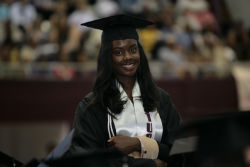 Nelms praised Belinda Behncke Biney, who graduated magna cum laude with a Master of Business Administration degree. Behncke Biney grew up in Germany, the daughter of parents who had emigrated from Ghana, and was usually the only black person in her classes. She came to the United States to attend Virginia Commonwealth University on a volleyball scholarship, but soon transferred to NCCU to experience life as a member of the majority at a historically black university. She received an undergraduate degree in political science and starred on the volleyball team. She had a year of eligibility remaining on her athletics scholarship, so she continued as a student-athlete during her first year of graduate school — and was named student-athlete of the year for 2010-11.
Nelms praised Belinda Behncke Biney, who graduated magna cum laude with a Master of Business Administration degree. Behncke Biney grew up in Germany, the daughter of parents who had emigrated from Ghana, and was usually the only black person in her classes. She came to the United States to attend Virginia Commonwealth University on a volleyball scholarship, but soon transferred to NCCU to experience life as a member of the majority at a historically black university. She received an undergraduate degree in political science and starred on the volleyball team. She had a year of eligibility remaining on her athletics scholarship, so she continued as a student-athlete during her first year of graduate school — and was named student-athlete of the year for 2010-11.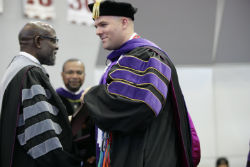 The chancellor also praised T. Greg Doucette, who received a Juris Doctor degree as a graduate of the NCCU School of Law. A onetime dropout from N.C. State University who was homeless for a time before returning to earn a degree at N.C. State, Doucette emerged as a student leader while a law student at NCCU. He served as president of both the UNC Association of Student Governments and the NCCU Student Bar Association
The chancellor also praised T. Greg Doucette, who received a Juris Doctor degree as a graduate of the NCCU School of Law. A onetime dropout from N.C. State University who was homeless for a time before returning to earn a degree at N.C. State, Doucette emerged as a student leader while a law student at NCCU. He served as president of both the UNC Association of Student Governments and the NCCU Student Bar Association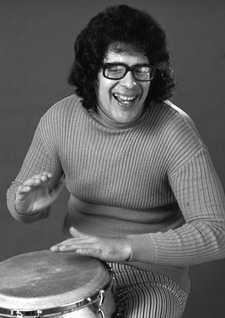 For nearly 40 years, conguero and bandleader Ray Barretto has been one of the leading forces in Latin jazz. His hard, compelling playing style has graced the recordings of saxophonists Gene Ammons, Lou Donaldson, and Sonny Stitt, and guitarists Wes Montgomery and Kenny Burrell.
For nearly 40 years, conguero and bandleader Ray Barretto has been one of the leading forces in Latin jazz. His hard, compelling playing style has graced the recordings of saxophonists Gene Ammons, Lou Donaldson, and Sonny Stitt, and guitarists Wes Montgomery and Kenny Burrell.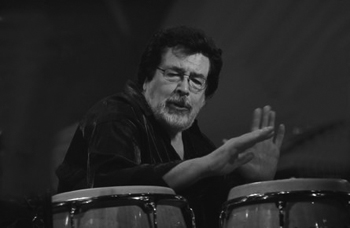 While in the service, Barretto quickly learned that military life was not going to protect him from racial discrimination. When he was stationed in Germany, he found a nightclub that catered only to black GI’s. It was at this club that Barretto began his musical career by playing the back head of a banjo.
While in the service, Barretto quickly learned that military life was not going to protect him from racial discrimination. When he was stationed in Germany, he found a nightclub that catered only to black GI’s. It was at this club that Barretto began his musical career by playing the back head of a banjo.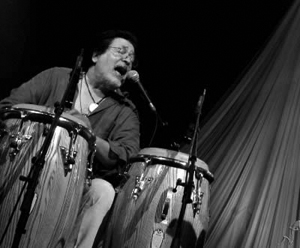 Unfortunately, at this point in jazz history, the conga drum was viewed as a mere adornment and Barretto rarely performed on the road with these musicians. Donaldson (left), who made some of his most significant Blue Note recordings with Barretto, never took Ray on tour.
Unfortunately, at this point in jazz history, the conga drum was viewed as a mere adornment and Barretto rarely performed on the road with these musicians. Donaldson (left), who made some of his most significant Blue Note recordings with Barretto, never took Ray on tour.